

Home - Counter-extremism: narratives and conversations. Open Education - Schools Extranet. Open Education Resources for Schools Conference The first UK OER Schools conference took place on Thursday 29 January 2015.
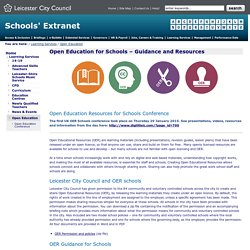
See presentations, videos, resources and information from the day here: Open Educational Resources (OER) are learning materials (including presentations, revision guides, lesson plans) that have been released under an open licence, so that anyone can use, share and build on them for free. New resource to help parents and carers talk to their children about pornography on the internet. Survey reveals a quarter of parents say they have spoken to their child about pornography.
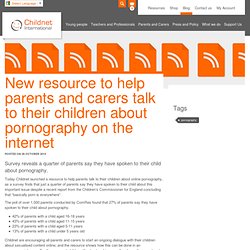
Today Childnet launched a resource to help parents talk to their children about online pornography, as a survey finds that just a quarter of parents say they have spoken to their child about this important issue despite a recent report from the Children’s Commissioner for England concluding that “basically porn is everywhere”. The poll of over 1,000 parents conducted by ComRes found that 27% of parents say they have spoken to their child about pornography. 42% of parents with a child aged 16-18 years43% of parents with a child aged 11-15 years23% of parents with a child aged 5-11 years13% of parents with a child under 5 years old Childnet are encouraging all parents and carers to start an ongoing dialogue with their children about sexualised content online, and the resource shows how this can be done in an age-appropriate way.
As one young person said: Simon Blake, CEO of Brook, said: Screen Time Topic Center. Let's talk about sex(ting), baby! This article discusses a mature topic.

Our 17-year old and younger readers are encouraged to read this with an adult. I know I’m not the only person who loves Jennifer Lawrence. In my ideal world, JLaw is in my book club and we brunch together while discussing classics in modern literature like Gone Girl and The Fault in Our Stars. We would toast each other with our vanilla soy lattes, and we’d say, “To the Best Friends Club!” Even though we —tragically— are not real-life besties, when I heard about her private photos being published on the Internet without her permission, it made me really sad for her. Despite the fact that we should all know this, I’m going to state it anyway: It’s NEVER okay to share or post someone else’s private photos or texts. As a health educator, I get a lot of questions about this topic. Do you have a question that you’d like to see answered in this column?
What if someone I really like wants me send them a naked picture of myself, but I don’t want to? The Forgotten Elements of Digital Citizenship. The week of Oct. 19-25 is dedicated to raising awareness about digital citizenship.
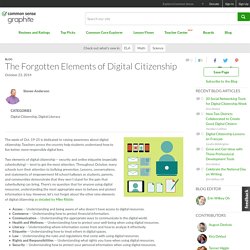
Teachers across the country help students understand how to live better, more responsible digital lives. Two elements of digital citizenship -- security and online etiquette (especially cyberbullying) -- tend to get the most attention. Throughout October, many schools turn their attention to bullying prevention. Lessons, conversations, and statements of empowerment fill school hallways as students, parents, and communities demonstrate that they won’t stand for the pain that cyberbullying can bring.
There's no question that for anyone using digital resources, understanding the most appropriate ways to behave and protect information is key. Beautiful Commercial From Thailand Disconnect to connect VIDEO. 2013-05-22_1603.png (632×477) How To Attribute Creative Commons Photos. Well Versed. KickthePJ feat. YOU! Ready to Learn? The Key Is Listening With Intention. Teaching Strategies WoodleyWonderWorks Listening and observing can be passive activities—in one ear and out the other, as our mothers used to say.
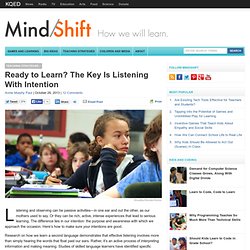
Or they can be rich, active, intense experiences that lead to serious learning. The difference lies in our intention: the purpose and awareness with which we approach the occasion. Here’s how to make sure your intentions are good. Research on how we learn a second language demonstrates that effective listening involves more than simply hearing the words that float past our ears. In 2010, for example, University of Ottawa researcher Larry Vandergrift published his study of 106 undergraduates who were learning French as a second language. So what are these listening strategies? • Skilled learners go into a listening session with a sense of what they want to get out of it. . • Once they begin listening, these learners maintain their focus; if their attention wanders, they bring it back to the words being spoken. Www.theparentzone.co.uk/sites/default/files/attachments/VM Resilience Report.pdf. Daniel Goleman: Attention is Like a Muscle. Apps and Websites for Empathy.
5 Ways to Stop Bullying and Move into Action. With daily news reports about the devastating impact on students who have been relentlessly bullied, teachers find themselves on the front line in addressing bullying and intolerance.
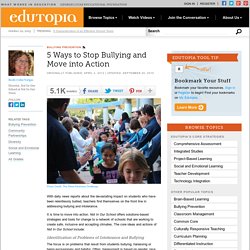
It is time to move into action. Social-Emotional Learning & Online Relationships Modules. Based on previous research efforts and Lab activities, the Youth and Media team has made great strides building a curriculum focusing on social/emotional learning, and, in particular, online relationships.
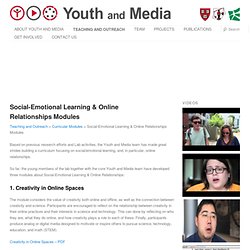
So far, the young members of the lab together with the core Youth and Media team have developed three modules about Social-Emotional Learning & Online Relationships: 1. Creativity in Online Spaces The module considers the value of creativity both online and offline, as well as the connection between creativity and science.